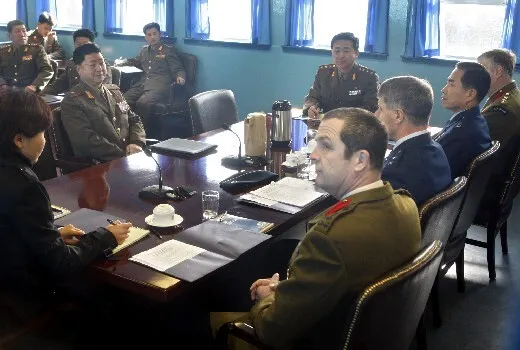hankyoreh
Links to other country sites 다른 나라 사이트 링크
N. Korea, S. Korea and UN Command trade blame for rising tensions on the peninsula

The United Nations Command and South Korea demanded yesterday that North Korea withdraw its threat to passenger airplanes, condemning it as inhumane.
North Korea said it cannot guarantee the safety of South Korean civilian airplanes passing through the North’s territorial airspace during the U.S.-South Korea joint military exercise Key Resovle, which is scheduled for March 9-20. It did not, however, mention the safety of civilian airplanes from other countries.
North and South Korea have allowed civilian airplanes to pass through their respective airspace since April 1998.
During the 16th round of “general-level” military talks between the UNC and North Korea, held at the truce village of Panmunjom, the UNC expressed strong objections to a recent threat from Pyongyang, saying that it does nothing to ease tensions on the peninsula and also is inhumane.
The North countered that a plan to go ahead with Key Resolve is the reason for the heightened tensions, and called for an immediate halt to the exercise.
The Seoul government also issued a statement, joining the UNC in condemning Pyongyang’s threat to passenger airplanes. “Making a military threat against the ordinary operation of civilian airplanes runs against international norms and is also inhumane.” It called on the North to withdraw the threat immediately.
Civilian airplanes are taking extra precautions as a result of the threat. “Right after the North’s statement was made, Korean Air and Asiana Airlines rerouted two of their planes and the adjusted flight plan remains in effect today... Discontinuation of the new flight plan will depend on future developments in the situation,” Seoul’s Unification Ministry said in a statement.
The airline companies are now preparing to adjust their flight plans, as rerouting the flights will increase the total flying time. A Korean Air official said, “The flight time will likely increase by around 30 minutes to 1 hour, and this could affect some passengers with tightly-scheduled connecting flights. Flight schedules will need to be adjusted.”
Korean Air will have to reroute 74 flights a week to Japanese airspace and Asiana Airlines will have to reroute 19, at a cost of between 3 million to 4 million won for the additional fuel consumed, according to information from officials of the two companies.
Please direct questions or comments to [englishhani@hani.co.kr]
Editorial・opinion
![[Column] The end of the road for NewJeans, or a new beginning? [Column] The end of the road for NewJeans, or a new beginning?](https://flexible.img.hani.co.kr/flexible/normal/500/300/imgdb/original/2025/1022/3617611258545507.jpg) [Column] The end of the road for NewJeans, or a new beginning?
[Column] The end of the road for NewJeans, or a new beginning?![[Editorial] Korea must prepare for rough road ahead with Japan [Editorial] Korea must prepare for rough road ahead with Japan](https://flexible.img.hani.co.kr/flexible/normal/500/300/imgdb/original/2025/1022/5517611229374291.jpg) [Editorial] Korea must prepare for rough road ahead with Japan
[Editorial] Korea must prepare for rough road ahead with Japan- [Editorial] Korea cannot afford to rush to a deal with the US
- [Column] Shared dilemmas at a historic turning point for Korea, Europe
- [Column] Halfway across the world, I’m cheering on Americans fighting for democracy
- [Column] How meritocracy turns into tyranny
- [Column] The real scandal of Korea’s ‘divorce of the century’
- [Column] The meritocracy to fascism pipeline
- [Column] Korea is not an enemy to be plundered
- [Column] Chaebol can’t take credit for KOSPI’s record rally
Most viewed articles
- 1Behind far right’s success is the failure of establishment parties, says expert
- 2North Korea fires ballistic missile toward East Sea
- 3Trump’s interest in Kim Jong-un stems from real estate development hopes, says ex-US official
- 4[Editorial] Korea must prepare for rough road ahead with Japan
- 5[Column] The end of the road for NewJeans, or a new beginning?
- 6[Interview] Politics of care as an antidote to divisions caused by meritocracy
- 7New hard-right Japanese PM poses test for Lee’s vision of Seoul-Tokyo cooperation
- 8World's top tennis player faces No. 2 in exhibition event in Seoul
- 9Senior Korean officials head back to US for final coordination before summit next week
- 10Korea’s Democrats unveil plan to expand Supreme Court from 14 to 26 justices